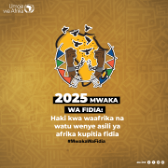
Africa Day Indaba 2025 for Australasia and the Pacific
This year’s Africa Day Indaba 2025 for Australasia and the Pacific will be on 23 May 2025, online.

Concept Brief (html)
Background Africa Day is commemorated on 25 May each year. This annual celebration marks the formation of the Organisation of African Unity (OAU), now the African Union (AU), and serves as an important occasion to raise awareness about Pan-African ideals, African history and help shape the continent’s journey towards socio-economic and political development.
The theme ‘The AU theme for 2025 is Justice for Africans and People of African Descent Through Reparations. According to the AU, this initiative underscores the AU’s commitment to addressing historical injustices, including the trans-Atlantic slave trade, colonialism, apartheid, and genocide. It builds on decades of advocacy and collaboration, aiming to foster unity and establish mechanisms for reparatory justice on a global scale. The OAU and its predecessor the AU have been working towards reparations and justice for historical crimes against Africans and people of African descent since 1963. The AU has supported initiatives to advance justice and the payment of reparations to Africans, as well as the restitution of cultural artifacts and heritage pillaged during colonization and enslavement. The continental movement for reparations began with political activism by prominent politicians, including Chief Moshood Kashimawo Olawale Abiola of Nigeria. The First Pan-African Conference on Reparations, sponsored by the Group of Eminent Persons (GEP) and the OAU, was held in 1993, leading to the Abuja Proclamation on Reparations. This conference emphasized the importance of reparations, and the moral debt owed to African peoples.’ (AU, 2025).
Why The Trump era emboldened far-right ideologies globally, leading to increased racial tensions, anti-immigrant policies, and historical revisionism. For Africans and Afro-descendant communities, this means the legacy of colonial exploitation continues to shape economic disparities. Institutional racism remains a barrier to justice, education, and wealth-building. Reparations discussions are dismissed or framed as divisive rather than necessary. Bringing elders into the conversation allows younger generations to understand the root causes of these injustices and how they manifest today, making it harder for history to be erased. Moreover, Artificial Intelligence is repeating and therefore reinforcing colonising ideals.
The event On Friday 23 May 2025 (two days before commemoration of Africa Day), the Africa Studies Association of Australia and the Pacific (AFSAAP), the African Australian Advocacy Centre (AAAC), the Australian Research Network for African Academics (ARNAA), Western Sydney University (WSU), the University of Wollongong (UOW) and the Centre for African Research, Engagement and Partnerships (CARE-P) at the University of Newcastle (UON) will host the second indaba online via Zoom. This year, the event will start with an intergenerational dialogue where elders and youth share their experiences of colonialism and racial injustice. The audience will be largely members and leaders and members of African academic and community organisations in the region, academics teaching and supervising students from Africa, students from Africa and all people interested in the continent.
What is an indaba An indaba is one of Africa’s group conversation techniques (it is also a method of research). Indaba is about sharing news, ideas and solutions. The essence of an indaba is to have as many people share and contribute to the discussion. Each speaker is expected to cover the following in their contribution:
(1) habari – what is my news; what my point of focus about the theme or topic.
(2) sankofa – looking back, what can we learn; and what the way is forward.
An indaba values voices of elders and griots, and use of names of respect, African dress, cuisine and languages. During the indaba participants are encouraged to put on an African attire, use their name of respect, use their protocols and speak with or use words from your language.
Organisers: Africa Studies Association of Australia and the Pacific (AFSAAP), the African Australian Advocacy Centre (AAAC), the Australian Research Network for African Academics (ARNAA), Western Sydney University (WSU), the University of Wollongong (UOW) and the Centre for African Research, Engagement and Partnerships (CARE-P) at the University of Newcastle (UON).
Concept Brief (pdf)
Registration link and code
To join the indaba, register here, click button or scan QR code. We hope you will be able to participate in this event.

Use the form below to subscibe to Owia Bulletin.
Discover more from Africa Social Work & Development Network | Mtandao waKazi zaJamii naMaendeleo waAfrika
Subscribe to get the latest posts sent to your email.


